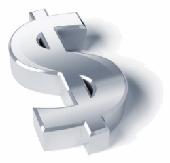
Learning the advantages of investing in the Foreign Currency Exchange Market (Forex) over the Stock or Commodity Market is of fundamental importance when considering the different types of investment. The Forex market offers so many advantages that it is not hard to understand its popularity.
This market is similar to the stock market, as people buy and sell, but the market and the over all results are much larger. On the Forex market, almost two trillion dollars are traded daily. The amount is much higher than the money traded on the daily stock market of any country. The profit potential comes from the fluctuations (changes) in the currency exchange market. The advantage of the Forex Market is that the regular daily fluctuations - often around 1% - are multiplied by 100.
Unlike the stock market, where shares are purchased, Forex trading does not require that you purchase or sell actual, physical currency: you work and trade with your own base currency and deal with contracts for amount and exchange rates of any currency pairs you wish to.
While the stock market operates only on business hours, the Forex Market operates 24 hours a day. It is a truly world wide market, constant trading is done in the Forex markets as time zones will vary and the markets will open in one country while another is near closing.
Although it has its trends and cycles, the Forex Market is not locked in the Bear vs. the Bull market mentality of the Stock Exchange. What happens in one market will have an effect on the other countries forex markets, but it is not always bad or good, sometimes the margins of trading are near each other. Since all Forex trades involve the exchange of one currency for another, one currency's hard times opens the door for a profit in another currency. The market is not adversely affected by rising interest rates. When a nation raises rates, normally the currency is strengthened, while rising interest rates tend to depress the stock market.
The number of different stock issues on the New York Stock Exchange and NASDAQ exceeds 8000. That is a lot of stocks and it is time consuming to keep up with even a portion of them. Opposed to it, there are four major currencies, and only about 34 second tier currencies, to consider in the Forex Market. Brokerage firms do not stand between you and profit in the Forex. Not only are the brokerage and commission fees almost non-existent, but analysts in the Forex tend to actually analyze in the currency market and not dictate or control the rise and fall of the market.
Short-term currency trading offers some unique attractions to private investors, like 24-hour trading, volatile markets offering profit opportunities, the ability to profit in rising as well as falling markets, leveraged trading with low margin requirements, options for zero commission trading.
To summarize it, when the two markets are compared, Forex currency trading certainly looks like the better investment choice, even under the present world economy conditions.







